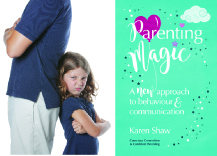
by Karen Shaw
author of Parenting Magic
It starts with us! How we approach a situation, what we do, say and how we are ‘being’ has a massive impact on the outcome.
Most of us want to avoid conflict. It’s uncomfortable and not what we want. It’s the incompatibility of ideas, desires and values that causes the conflict. Often parents and children have conflicting interests because they have a different set of values and priorities. We can experience conflict in parenting often when our children are toddlers when we can have a battle of wills, when they are ‘flexing their muscles’ and when we have teenagers and of course, at any age in between! We can help control outcomes and see much more cooperation by pre-setting the energy of a situation, with our intentions and the choice of language we use.
That’s a good start…
How does your day start? Is it frantic, rushing around, a bit chaotic? This leads to struggles and arguments, so start it off in a calm and controlled way and set the intention of how it will be. It may mean getting up a bit earlier to take a few minutes for you. To take a few deep breaths, meditate to calm yourself. If possible be organised the night before, plan your morning, have a diffuser with essential oils or some lovely smells for the children to wake up to. It sets the scene, the energy is calmer.
How to avoid arguments
We often argue with our children because we’re not getting our own way. Because they’re not doing as they’re ‘told’ (though I prefer asking to telling!) or they want to do something we don’t want them to. I think it’s often beneficial to think, “How would I deal with this situation if it was someone other than my child, would I say the same things, use the same language?” Probably not, we tend to think because they are ‘our children’ we have a right to speak to them, as we like, say things to them we wouldn’t dream of saying to another individual. I know we want to keep them safe and respect us, or our ‘rules’ if you like. Though, as rules are there to be tested, pushed, bent if not broken, it is better to have ‘agreements’ already in place. Make agreements as to what is and isn’t acceptable, what will and won’t be tolerated and have the consequences when expected behaviour isn’t reached. When they are part of the agreement making, they are heard, valued and they know they have agreed. So if they complain or shout back, when they haven’t stuck to them “It’s not fair”, “You’re so mean”, you can remind them they agreed and are going back on their word.
Drop the interrogation!
We often start our conversation with the ‘w’ words and that’s not helpful. The ‘w’ words I mean are Why, When, Who, What and Where.
These are ‘interrogatives’. We’re interrogating our children when we start a question with any of these. For instance:-“Why on earth…? “When are you ever going to learn…?” “Who do you think you are…?” “What did you think you were doing…?” “Where do you think you’re going…?”
The reason it isn’t helpful to start a conversation this way, is because they feel threatened and automatically go into defence mode. It’s the unconscious mind responding, a natural response. Of course, we’ll use these words, it’s just not helpful to start with them, especially with the negative energy that accompanies it. It will encourage a knee jerk response, a story or a flippant reply. Give them time to respond better by keeping calm, breathe, collect your thoughts and use something like: “I’m wondering (then the what or who)…” “I’m curious (then the why or what)…“ Or “I’d like to know/hear/understand…”
These are ‘declaratives’. You respond rather than react and give them time to formulate a response to your question or statement instead of a defensive or even sarcastic reply. You are starting with you and are ‘declaring’ how you are feeling.
When we remember who we and our children are, human beings sharing a life and here to enjoy it, that we are in control of ourselves, no one else and that what comes out of our mouths is our choice, then it’s easier to remember there really is no need to argue. Let’s face it, it takes two. What good is there in arguing with your child? Debating something, where you are both putting forward your viewpoint is a different thing. For every action there is an equal and opposite one, when you react to whatever has been done or said, then there will be an equal opposite one coming back at you! Avoid it. Let’s learn to respond not react.
Karen Shaw is a transformational life and parenting coach, emotional re-balancing and energy alignment therapist and creator of Parenting Magic. She was a stressed-out single mum
on anti-depressants. With three teenage sons, all affected by challenged, illness, medical conditions, psychological issues and labelled with ‘disabilities’. Struggling in every area of her life. In Parenting Magic, she shares the hard earned secrets that transformed her family life for good.
Parenting Magic by Karen Shaw is published by Practical Inspiration Publishing, £16.99.











